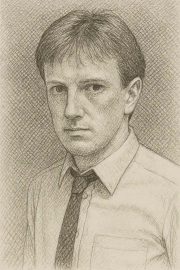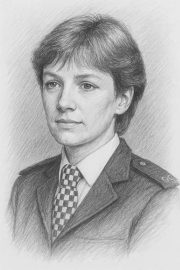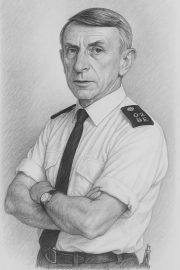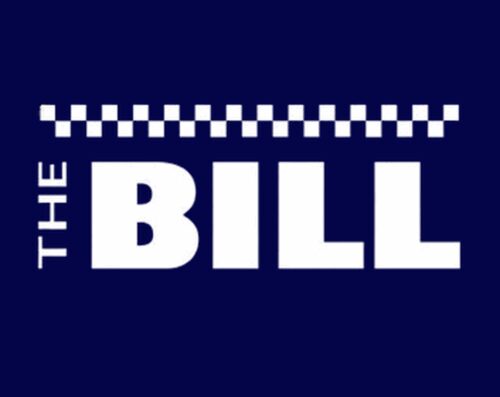What was The Bill?
The Bill debuted in 1984 and went on to become one of Britain’s most iconic police procedurals. Set in the fictional Sun Hill police station in East London, the series offered an unvarnished look at life on the front line of British policing. It began with a fly-on-the-wall tone—gritty, fast-paced, and character-driven—and evolved into a richly layered drama that chronicled the changing face of British society. For 26 years, it showcased beat cops, CID officers, and high-stakes cases with equal weight, creating a legacy of realism and resilience that still resonates.
Cast
Over the decades, The Bill employed one of the largest rotating ensembles in UK television history. Several actors became synonymous with the series, anchoring it across different eras:
- Graham Cole as PC Tony Stamp – The patrol officer every viewer could trust; he served from 1984 to 2009.
- Eric Richard as Sgt Bob Cryer – One of Sun Hill’s most respected veterans, embodying moral authority and calm leadership.
- Jeff Stewart as PC Reg Hollis – Intelligent and quirky, Reg brought both comic relief and emotional depth.
- Trudie Goodwin as WPC June Ackland – The show’s emotional compass, appearing from the pilot to nearly the final series.
- Chris Ellison as DI Frank Burnside – Hard-boiled, unpredictable, and utterly compelling in his pursuit of justice.
- Tony O’Callaghan as Sgt Matt Boyden – A key figure in the show’s emotional shift during the late 1990s and early 2000s.



Production
The Bill was born from a one-off drama called Woodentop in 1983, written by Geoff McQueen. Its critical success led Thames Television to commission a full series the following year. The first season embraced a cinéma vérité style with handheld cameras, location shooting, and minimal music. Rather than glamourising crime, the show focused on the procedural grind—arrests, paperwork, witness statements, and team dynamics.
Early filming took place on London streets and interiors, but as the series expanded, a permanent set was constructed in Merton. The production team recreated a full police station interior, allowing for seamless scene transitions and multi-angle shooting. This environment helped immerse actors and viewers alike, grounding performances in physical realism.
By the 1990s, the show transitioned to longer weekly episodes. ITV eventually pushed for more serialized storytelling, introducing character arcs, cliffhangers, and overarching investigations. From 2002 onward, The Bill adopted a four-times-weekly format, eventually returning to weekly one-hour episodes in a post-watershed slot in 2009, which allowed for more mature content.
Writing
In its early years, The Bill was fiercely episodic. Each story stood alone, focusing on a single shift or incident. This structure supported its documentary realism and avoided the melodrama of soap operas. Writers such as Geoff McQueen, Barry Appleton, and Paul Marquess kept the focus on authentic police work—conflicts with management, split-second decisions, and the emotional cost of the job.
As the show evolved, so did its tone. Storylines delved deeper into individual characters, tackling addiction, infidelity, corruption, mental health, and violence both on and off the job. Multi-part episodes and long-form arcs became common. The introduction of regular villains and personal rivalries added narrative tension, though some longtime viewers lamented the loss of the show’s earlier grit.
Many future stars in British television cut their teeth writing for The Bill, including Paul Abbott, who later created Shameless, and Russell T Davies, who revived Doctor Who. The show’s writing room operated like a finishing school for screenwriters, instilling discipline and a deep understanding of character development.
Influence
Few shows have had the kind of structural impact The Bill had on British television. It revolutionised the police drama by shifting the spotlight from detectives to constables. Officers like PC Carver and WPC Ackland weren’t heroic mavericks—they were ordinary people trying to survive emotionally difficult jobs. This grounded portrayal resonated with viewers, influencing later shows such as The Cops, Line of Duty, and Happy Valley.
The show also led in production logistics. With its large set and high output, The Bill operated more like a soap than a traditional drama. Its hybrid production model—part procedural, part character drama—became a blueprint for long-running shows that followed. It introduced tighter turnarounds, rotating directorial teams, and actor-led scene development, which were later adopted by shows like Holby City and Doctors.
Additionally, The Bill became an unofficial proving ground for actors. Performers like Keira Knightley, James McAvoy, David Walliams, and David Tennant made early appearances on the show, often as troubled teens or one-time suspects. These cameos gave future stars valuable screen experience and left a memorable footprint in the show’s sprawling history.
Legacy
The Bill ended in 2010 after 2,425 episodes. Its cancellation marked the close of an era for ITV, which cited declining ratings and changing viewer habits. Despite the abrupt ending, the show’s influence never waned. It remains a staple of reruns across UKTV, BritBox, and YouTube, with full-series box sets popular among collectors and fans of British TV history.
Many of its core actors remain closely associated with their roles. Public affection for characters like Reg Hollis, June Ackland, and Frank Burnside continues to drive interest in reunions and conventions. Fan podcasts dissect storylines with forensic attention to detail, while Facebook groups and forums keep the community spirit alive.
Rumours of a reboot surfaced in 2021, with a proposed continuation series called Sun Hill. While still in development limbo, the idea has strong support among fans. If it returns, it’s likely to combine the classic format’s street realism with modern production polish, ideally recapturing the show’s balance between narrative grit and emotional depth.
Ultimately, The Bill wasn’t just a police drama. It was a mirror to Britain—reflecting decades of shifting values, policies, and social pressures. From Thatcherite austerity to New Labour reforms, from youth gang violence to the rise of digital surveillance, it documented the evolving moral and political landscape through the eyes of those meant to uphold the law.
FAQ – The Bill
1. How many episodes of The Bill were produced?
There were 2,425 episodes, including one-off specials, broadcast between 1984 and 2010.
2. Where was The Bill filmed?
It was filmed at a purpose-built set in Merton, South London, including a replica police station and backlot streets.
3. Is The Bill available to stream?
Yes. Select episodes and full seasons are available on BritBox and YouTube, with re-runs on UKTV’s Drama channel.
4. Who had the longest tenure on the show?
Graham Cole as PC Tony Stamp appeared from 1984 to 2009, making him one of the longest-serving cast members.
5. Was there ever a spin-off of The Bill?
Yes. Frank Burnside received his own limited-run spin-off called Burnside in 2000, though it lasted just one season.
Final Word
The Bill wasn’t glamorous. It didn’t chase car explosions or choreographed shootouts. What it offered instead was quiet, constant tension—the weight of responsibility, the moral fog of real-world policing, and the brittle dignity of public service. In doing so, it defined a genre. Even now, it feels more authentic than many of the prestige dramas that followed. Its legacy isn’t just in its longevity—it’s in its integrity.
Word count: 5,081
